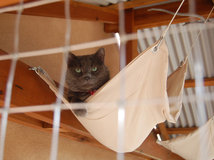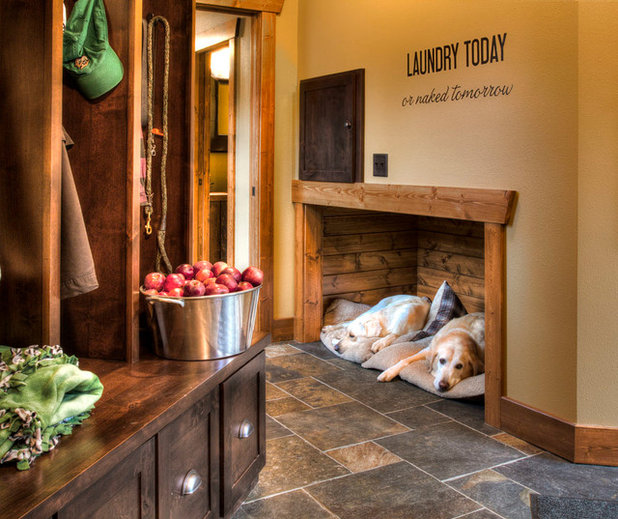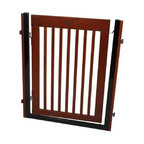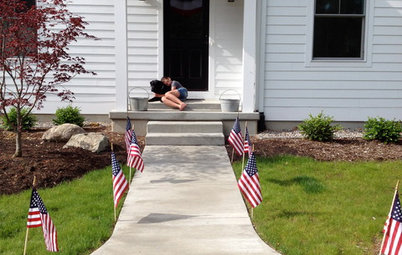Keeping Your Pet Calm and Carrying On During Fireworks
A few proactive steps can keep pets safer and feeling less stressed when the Fourth of July rolls around
Gwendolyn Purdom
July 1, 2018
Houzz Editorial Staff. Lover of architecture, history, dogs, the Chicago Cubs, crowded bookshelves, and homes with a story. Former editor at Preservation mag and Culturess.com.
Houzz Editorial Staff. Lover of architecture, history, dogs, the Chicago Cubs, crowded... More
For many people, Fourth of July fireworks mean an annual celebration marked by barbecues, family gatherings and enchanting bursts of colorful light. For many pets, though, those same bursts of light and sound can be terrifying and disorienting, causing reactions ranging from destroying furniture to running away. “Generally speaking, animals do well with consistency, so fireworks and the celebrations they come with can catch animals off guard,” says Dr. Lori Bierbrier, medical director for the community medicine department of the American Society for the Prevention of Cruelty to Animals.
There are a number of preventative measures pet owners can take before and during fireworks — or other alarming sound events, such as thunderstorms — to keep their pets calm and safe, Bierbrier and other veterinarians say. Here are some of the experts’ go-to stress-reduction suggestions.
There are a number of preventative measures pet owners can take before and during fireworks — or other alarming sound events, such as thunderstorms — to keep their pets calm and safe, Bierbrier and other veterinarians say. Here are some of the experts’ go-to stress-reduction suggestions.
Prepare Your Pet
If you know fireworks will be set off nearby in the near future, your dog or cat (or rabbit or hamster) might benefit from gradually being desensitized to them. Playing recordings of fireworks or thunderstorms at increasing volumes in the weeks leading up to the festivities might help normalize the experience. This can be particularly helpful if your pet is exposed to such noises at a young age.
“It can be very helpful during the socialization period of young puppies and kittens to present them with many different environmental stimuli so that this is not scary later in life,” Bierbrier says.
Not all pets react to fireworks or other loud noises in the same way, and some don’t react at all. “If a dog or cat exhibits anxiety over new people in the home, to noises or bright light displays, or is an anxious or nervous pet in general, there is a strong possibility they will also be more susceptible to having anxiety during the Fourth of July fireworks displays,” Dr. Heidi Houchen of VCA Northwest Veterinary Specialists in Oregon says. Pets can also start exhibiting these issues at any time, so Houchen recommends that owners always watch for signs of distress (panting, pacing, hiding, barking, shaking and other signs of agitation) and discuss ways they can help their pets with their veterinarians ahead of time.
Other proactive steps might include making sure your pet has had plenty of exercise before the event, so he or she is a little more tired out and doesn’t have extra energy to express, and keeping things as routine as possible at home.
If you know fireworks will be set off nearby in the near future, your dog or cat (or rabbit or hamster) might benefit from gradually being desensitized to them. Playing recordings of fireworks or thunderstorms at increasing volumes in the weeks leading up to the festivities might help normalize the experience. This can be particularly helpful if your pet is exposed to such noises at a young age.
“It can be very helpful during the socialization period of young puppies and kittens to present them with many different environmental stimuli so that this is not scary later in life,” Bierbrier says.
Not all pets react to fireworks or other loud noises in the same way, and some don’t react at all. “If a dog or cat exhibits anxiety over new people in the home, to noises or bright light displays, or is an anxious or nervous pet in general, there is a strong possibility they will also be more susceptible to having anxiety during the Fourth of July fireworks displays,” Dr. Heidi Houchen of VCA Northwest Veterinary Specialists in Oregon says. Pets can also start exhibiting these issues at any time, so Houchen recommends that owners always watch for signs of distress (panting, pacing, hiding, barking, shaking and other signs of agitation) and discuss ways they can help their pets with their veterinarians ahead of time.
Other proactive steps might include making sure your pet has had plenty of exercise before the event, so he or she is a little more tired out and doesn’t have extra energy to express, and keeping things as routine as possible at home.
Have a Safe Space Ready
All three veterinarians we spoke with stressed the importance of not taking a pet to a fireworks show. “They will be safer, calmer and more comfortable in a quiet, familiar space,” Bierbrier says. If someone is able to be home with the anxious animal during the fireworks, that’s ideal.
Pets experiencing a fight-or-flight response may try to find a place to run away to, so having a secure area of your house “as far away from the noise and smells as possible” for them to hide in can help, Dr. Patty Khuly of Miami’s Sunset Animal Clinic says. That might mean placing a favorite blanket or toy in the animal’s crate if that’s a comforting place (though some pets might become frantic and destroy a crate in this situation) or keeping the animal in a cool, quiet part of your home, such as a bedroom or basement.
16 Stylish Built-In Sleeping Areas for Dogs
All three veterinarians we spoke with stressed the importance of not taking a pet to a fireworks show. “They will be safer, calmer and more comfortable in a quiet, familiar space,” Bierbrier says. If someone is able to be home with the anxious animal during the fireworks, that’s ideal.
Pets experiencing a fight-or-flight response may try to find a place to run away to, so having a secure area of your house “as far away from the noise and smells as possible” for them to hide in can help, Dr. Patty Khuly of Miami’s Sunset Animal Clinic says. That might mean placing a favorite blanket or toy in the animal’s crate if that’s a comforting place (though some pets might become frantic and destroy a crate in this situation) or keeping the animal in a cool, quiet part of your home, such as a bedroom or basement.
16 Stylish Built-In Sleeping Areas for Dogs
Set a Calming Mood
In addition to having a human present, calming elements such as a chattering TV, music or air conditioning might help pets relax. Specialized recordings such as the Through a Dog’s Ear products help calm some anxious animals, Khuly says, but just having some distracting background noise can also make a difference.
In addition to having a human present, calming elements such as a chattering TV, music or air conditioning might help pets relax. Specialized recordings such as the Through a Dog’s Ear products help calm some anxious animals, Khuly says, but just having some distracting background noise can also make a difference.
Other products designed to relieve anxiety, such as swaddle-style vests or pet-mimicking pheromone collars, might help some pets as well, though the vets noted that essential oils and diffusers can be toxic to pets (cats especially). Owners should speak with a veterinarian before trying a new calming approach and continue monitoring their animals’ individual reaction. In some extreme cases, anti-anxiety medication may be prescribed.
Watch for Escape Artists
One of the biggest dangers of fireworks is that they can provoke frightened animals to try to run away. The Washington Post and other news outlets have reported an annual uptick in animal shelter intakes immediately following the Fourth of July, and the vets we spoke to reported similar experiences.
Houchen cited instances of pets running into the street and getting hit by cars, jumping out windows or crashing through sliding glass doors during fireworks. “Bring outside pets inside a home, garage or place that is safe, quiet, has no sharp objects or sharp-edged furniture,” she advises. “Keep pets inside in a quiet, dark area with limited access to windows or other potential hazards.” Even if the pet is indoors, play it safe by making sure it has a collar, microchip and ID tag with up-to-date contact information in case it somehow manages to get out.
See more tips for keeping your pet safe during the holidays
One of the biggest dangers of fireworks is that they can provoke frightened animals to try to run away. The Washington Post and other news outlets have reported an annual uptick in animal shelter intakes immediately following the Fourth of July, and the vets we spoke to reported similar experiences.
Houchen cited instances of pets running into the street and getting hit by cars, jumping out windows or crashing through sliding glass doors during fireworks. “Bring outside pets inside a home, garage or place that is safe, quiet, has no sharp objects or sharp-edged furniture,” she advises. “Keep pets inside in a quiet, dark area with limited access to windows or other potential hazards.” Even if the pet is indoors, play it safe by making sure it has a collar, microchip and ID tag with up-to-date contact information in case it somehow manages to get out.
See more tips for keeping your pet safe during the holidays
Be Aware of Other Fireworks Dangers
Beyond scaring pets, fireworks’ presence in the home or garage — or leftover shells at a park — can also pose a hazard. “Fireworks in shiny packages can look like an appetizing snack and, if eaten, can cause even more chaos once inside an animal,” Houchen says. “As most fireworks are made overseas, getting an exact ingredient list of what is in each firework is often not possible. Also, spent fireworks, if ingested, can pose as much of a danger as the new ones.” Ingestion of fireworks can cause nausea, vomiting and ulceration of the mouth or GI tract, as well as organ damage, respiratory problems and other issues. An animal that swallows fireworks should be treated by a vet immediately.
Beyond scaring pets, fireworks’ presence in the home or garage — or leftover shells at a park — can also pose a hazard. “Fireworks in shiny packages can look like an appetizing snack and, if eaten, can cause even more chaos once inside an animal,” Houchen says. “As most fireworks are made overseas, getting an exact ingredient list of what is in each firework is often not possible. Also, spent fireworks, if ingested, can pose as much of a danger as the new ones.” Ingestion of fireworks can cause nausea, vomiting and ulceration of the mouth or GI tract, as well as organ damage, respiratory problems and other issues. An animal that swallows fireworks should be treated by a vet immediately.
Look Out for Other Scary Summer Sounds
Similar calming measures can work for thunderstorms and other potentially upsetting light and noise events, though some pets react differently to fireworks than they do to thunderstorms. Storms, for instance, might occur more often and without warning, so veterinarians may suggest focusing more on behavior modification to treat that specific phobia.
Again, monitoring a pet in both situations and working with your vet to be prepared and respond to your animal’s specific reaction is key. “An ounce of prevention is worth a ton of cure,” Houchen says, “or a tragic and expensive trip to the veterinary emergency room.”
Tell us: How do your pets respond to fireworks and storms? How do you keep them calm? Tell us in the Comments.
More
Pet-Proofing Your Home: A Room-by-Room Guide
Read more about pets
Find pet products
Similar calming measures can work for thunderstorms and other potentially upsetting light and noise events, though some pets react differently to fireworks than they do to thunderstorms. Storms, for instance, might occur more often and without warning, so veterinarians may suggest focusing more on behavior modification to treat that specific phobia.
Again, monitoring a pet in both situations and working with your vet to be prepared and respond to your animal’s specific reaction is key. “An ounce of prevention is worth a ton of cure,” Houchen says, “or a tragic and expensive trip to the veterinary emergency room.”
Tell us: How do your pets respond to fireworks and storms? How do you keep them calm? Tell us in the Comments.
More
Pet-Proofing Your Home: A Room-by-Room Guide
Read more about pets
Find pet products
Related Stories
Shop Houzz
Vanities We Love Under $999
By Houzz
See our favorite designs for keeping your remodel stylish and on budget
See Products
Life
How to Hang the American Flag at Home
We’ll show you how to display the American flag on your house for Memorial Day, the Fourth of July or all year round
Full Story
146
Features
Stars, Stripes and the Unsung Woman Who Sewed Them in Baltimore
Mary Young Pickersgill’s legacy lives on in the house where she made the national anthem-inspiring Star-Spangled Banner
Full Story
2
10 Kitchens That Nail Red, White and Blue
In honor of Independence Day, check out these kitchens rocking a patriotic color palette
Full Story
28
Shop Houzz
This Summer’s Bestselling Lighting
By Houzz
Trending fixtures for this season and beyond
See Products
1
Holidays
100 Homes Around the U.S. Say Happy Fourth of July!
Enjoy a visual tour of houses and gardens stretching from mountains to desert and sea to shining sea
Full Story
21
Color Palettes
9 New Ways With Red, White and Blue
By Jennifer Ott
With subtle adjustments to hue, tint, tone or shade, this patriotic color combo works for more than just the U.S. flag
Full Story
19
Holidays
Celebrate Patriotism All Year With Americana Style
By Becky Harris
Cozy quilts, folk art, gingham and American flags help proclaim pride in the country even after the Fourth of July
Full Story
10
Holidays
March Into Year-Round Chic With 15 Twists on Red, White and Blue
By Becky Harris
Parade your patriotism and your style sophistication with new looks for a classic color trio. Drumroll, please ...
Full Story
22
Shop Houzz
Outdoor Lounge Sets With Free Shipping
By Houzz
Shop sectionals, chaises and chair sets for patios big and small
See Products
3



























































Our Brittany was left at a shelter because he wouldn’t hunt and was afraid of gunshot. We were lucky to adopt him, and he is still afraid of loud sounds- fireworks, thunderstorms and car backfires. He has a cushy crate he loves and a thundershirt which help. However the neighborhood we live in is very noisy on the 4th. This year we got him some gentle sedatives from our Vet. We stay home with him. He pants, shakes and crys. Poor baby. It’s hard because they don’t understand it’s not a threat. Fireworks are not worth the harm to both pets and wildlife.
Love seeing articles like this! Thank you Houzz.